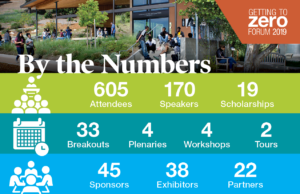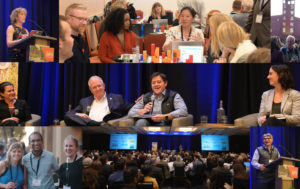As urgency around addressing climate change increases, local leaders are working to define near-term actions, including those targeting the built environment, which accounts for 39% of global carbon emissions. Uptake in actions happening across the United States include: a surge in local and state policies aimed at driving down building sector carbon emissions; climate policy entering the presidential debates; design and construction professionals coalescing around the need to build capability to deliver on energy outcomes for buildings; and youth and community leaders mobilizing for climate action.

By many measures, the 2019 Getting to Zero Forum held last month in Oakland, California, felt like the culmination of these developments. With newfound urgency, there was a call for transformative changes in the building sector through the development and implementation of practical and innovative solutions. The sense of optimism about the viable solutions available to curb carbon from the built environment was palpable. The delegates that came together for the Forum, which was the fifth gathering dedicated to zero energy and zero carbon performance in commercial and residential buildings, brought expertise and solutions to share. Also palpable was the pressing need for immediate climate action and a call for attendees to share their support and knowledge with local government so that policies favoring a new energy future for the built environment could move forward. The leadership of this movement—policymakers, designers, engineers, builders, manufacturers, and industry groups—are excited, committed and poised for action!
Oakland, the heart of the world’s fifth largest economy, provided an ideal setting to bring professionals from industry and government together. Serving as the official follow-on event of the 2018 Global Climate Action Summit held in September of 2018 in San Francisco, among national and global action, the Forum showcased California policy leadership and progress on getting to zero in the built environment. The Forum kicked off in the midst of a climate-related Public Safety Power Shutoff occurring just blocks from the venue, which impacted almost 1 million utility customers. Wildfire damage and the economic losses of shutting off power to so many residences and business is estimated to be $80 billion for citizens and business in California, on top of the $400 billion in losses in 2018 and $85 billion in 2017, and illuminate the true cost of a warming planet.
The Forum’s Arc of Transformation in Themes
As we have tracked the progress of leading jurisdictions, building owners and designers on their pathway of getting to zero over the past decade—both through the Getting to Zero Forum and our Getting to Zero Building Database—we have witnessed progressive stages of transition. The industry has gone from policy aspiration to policy development. Now and in the years to come, we’re moving to policy implementation and market delivery.

A number of themes, including electrification, decarbonization, building-grid integration, embodied carbon, and finance emerged as important topics through the week and were represented in the Forum workshops, education sessions and plenary sessions. The plenaries followed an arc of transformation for the built environment that spotlighted the many priorities for this market. These included:
Addressing equity is absolutely essential. The opening keynotes from Kat Taylor, CEO and co-founder of Beneficial State Bank, and Jigar Shah, President and co-founder of Generate Capital, described the two sides of equity: social equity through the development of safe, affordable zero energy housing to fill the gap in available housing that exists in cities throughout the country, and financial equity needed to unlock billions of dollars in financial capital that is currently sidelined because of the lack of effective policies.
Innovation drives efficiency in existing buildings and addressing embodied carbon. The Carbon Technology plenary showcased new technology solutions like the EC3 software tool that helps to measure the embodied carbon impacts of construction materials; Advanced Microsystems software that harnesses buildings as virtual batteries for the grid; and Energie Sprong’s transformation of multifamily buildings to zero energy buildings in the course of one day.
Practitioners will ready themselves to deliver. During the Industry Titans plenary, building industry leaders AIA, ASHRAE, USGBC and WRI shared the stage to describe their organizations’ commitments to getting to zero and how they are leading advances in their respective disciplines to inspire, educate and provide resources to their members in order to mainstream, scale up and accelerate building industry transformation to zero. Panelists emphasized that as advanced policies are implemented, industry professionals can and need to deliver. Many in attendance are already pushing the envelope, doing it well, and sharing what they know through peer-to-peer exchanges. Anica Landreneau, Director of Sustainable Design at HOK, enthusiastically shared, “Don’t ask for permission to shoot for zero energy: Just do it.”
Policy drives scale. During the closing plenary, California Energy Commissioner Andrew McAllister, and NYSERDA senior advisor, Greg Hale, recounted the substantial progress their respective states have made on policy development, while acknowledging the scale of the challenges we face and the uphill climb in front of us. McAllister shared examples of the quickening of progress in just the past year as another indicator of progress. Hale highlighted the potential for collaboration among leading states and a newfound enthusiasm about integration of embodied carbon into the Zero Carbon Building Roadmap currently under development in New York.
We can all take action to achieve a zero energy future for the built environment. On behalf of all who participated in the 2019 Getting to Zero Forum, we hope the information shared, connections made and inspiration felt at the conference sustains your optimism until we meet again. As New Buildings Institute and Rocky Mountain Institute ramp up planning for the next Forum, March 15-17, 2021, in New York City, we will be looking for opportunities to catalyze action and scale up impact. As the industry continues to move from policy aspiration and policy development to policy implementation and market delivery, it will require each and every one of us to do our part. Whether supporting local policies that support better building efficiency and decarbonization, getting involved in finding solutions for affordable zero energy housing, or banking with financial institutions that are investing in climate solutions, we will get to zero faster together.
by Ralph DiNola, CEO, New Buildings Institute and Victor Olgyay, Principal, Rocky Mountain Institute

